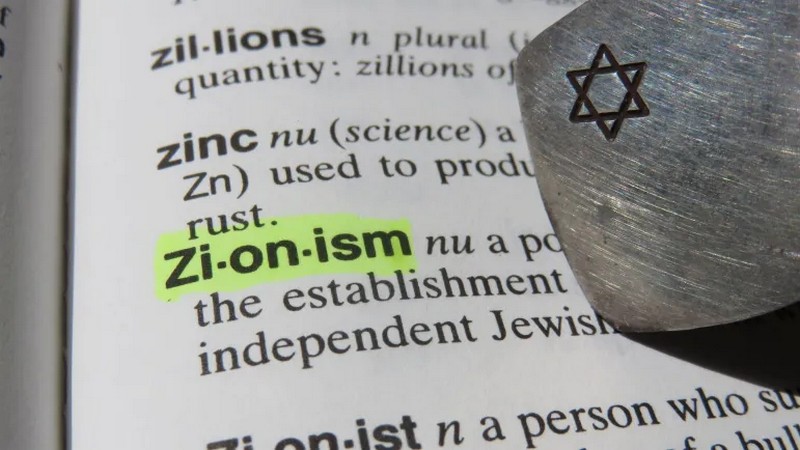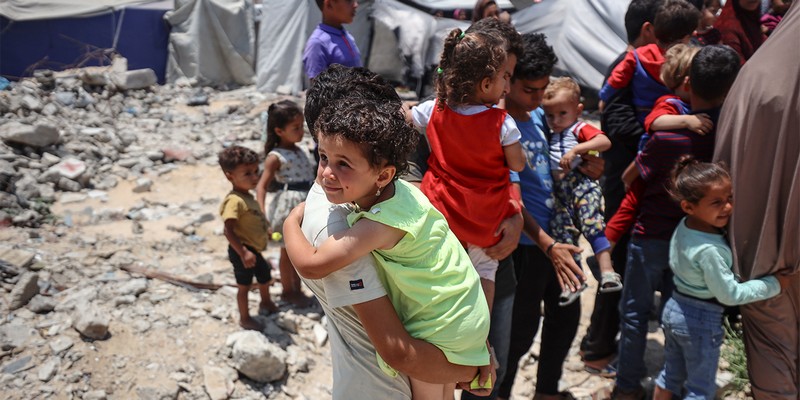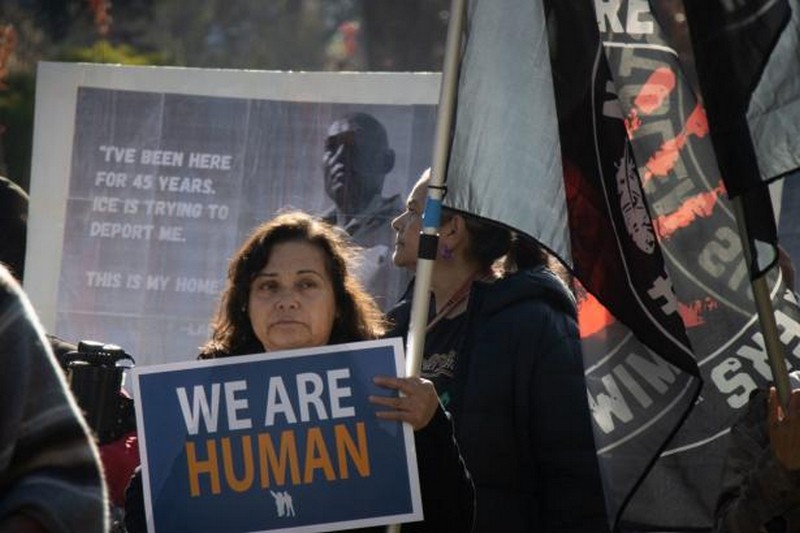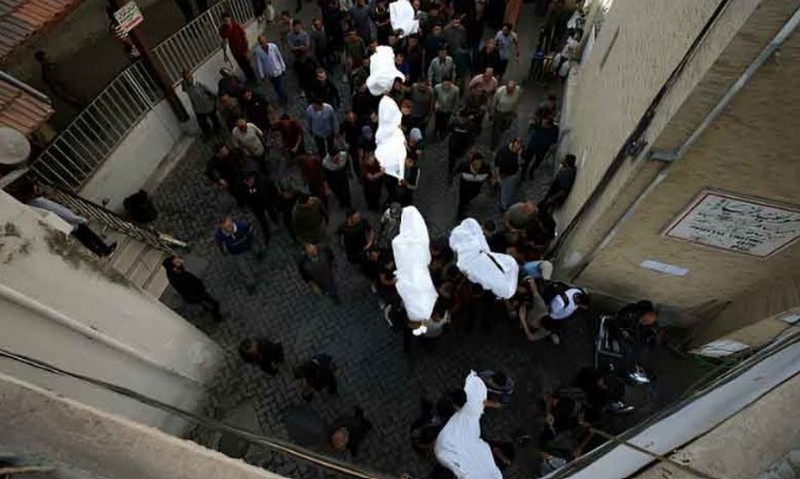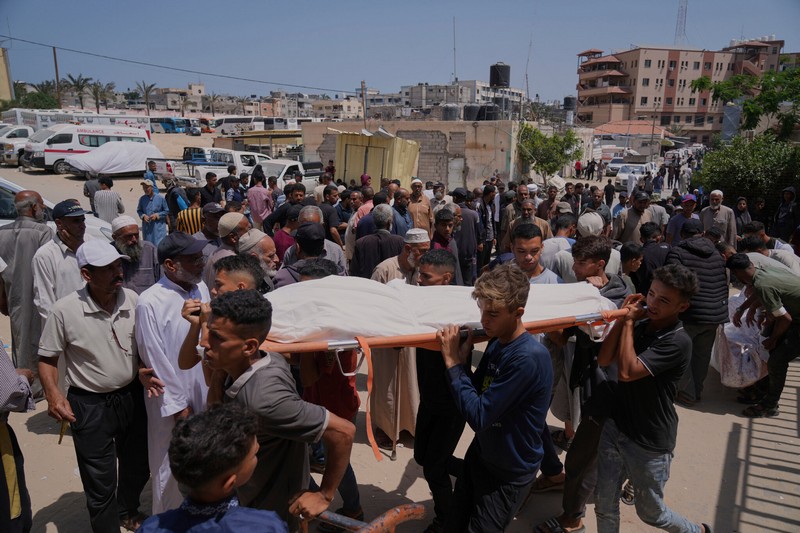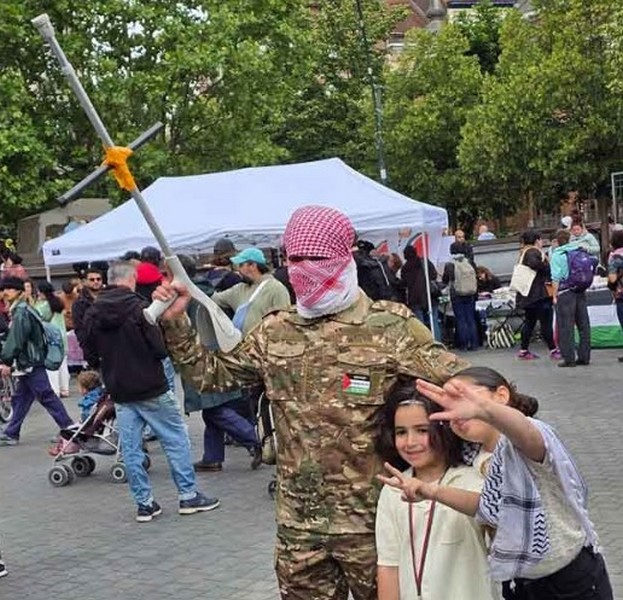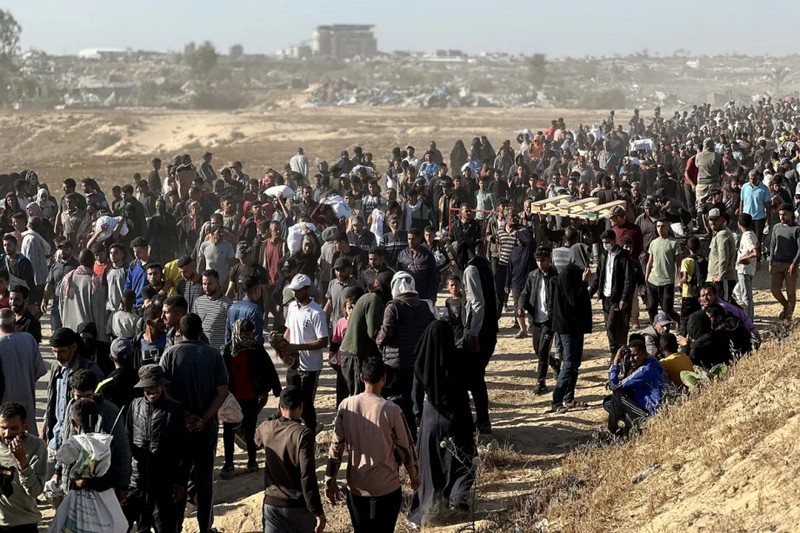By Aviva Chomsky
In an aphorism sometimes attributed to Leo Tolstoy, sometimes to John Gardner, all literature relies on one of two plots: a person goes on a journey or a stranger comes to town.
Let me offer my own version. We might summarize the entire history of the human race in two words: people move. Everything else is just elaboration on that basic plot.
Some of history’s worst atrocities can be attributed to certain people trying to control other people’s movements, whether by capturing them, herding them into prison camps (concentration camps, strategic hamlets, model villages), enslaving and transporting them, or warehousing them in besieged countries or regions while barricading the borders of anyplace to which they might want to flee, often consigning them to death in treacherous deserts or seas for trying to exercise the basic human right of freedom of movement.
European Freedom and Colonial Domination
In February, President Trump astonished the world by proclaiming that the United States should “take over” Gaza and rid it entirely of its Palestinian population. Yet in many ways, as startling as that might have seemed, his proposal fit right in with his drive to remove millions of people from the United States. Both reflected a colonial arrogance that the U.S. and Israel share: the idea that some people (Americans/Europeans/Whites/colonizers) have the right to move themselves as they desire while moving others against their will. Consider it, after a fashion, a contemporary (as well as historic) version of apartheid.
Forcing people to move or prohibiting their mobility are two sides of the same colonial or neocolonial coin. Colonizers invade and drive people out or enslave, transport, enclose, and imprison them while barricading off the privileged spaces they create for themselves. In a vicious cycle, colonizers or imperial powers justify their borders and walls in the name of “security” while protecting themselves from those desperate to escape their domination. And such ideas, old as they may be, are still distinctly with us.
European imperial actors from Christopher Columbus on claimed the right to freedom of movement on this planet. Today, the flyer you get in the mail with your passport proudly insists that, “with your U.S. passport, the world is yours!”
Or consider historian and scientist Jared Diamond’s nonchalant claim that “no traditional society tolerated the relatively open access enjoyed by modern American or European citizens, most of whom can travel anywhere… merely by presenting a valid passport and visa to a passport control officer.”
Diamond argued that Americans and Europeans exemplify the freedoms of modernity, while more “traditional societies” oppress people by restricting their travel. But if Americans and Europeans enjoy the freedom to travel, it’s not because they are so much more modern than other inhabitants of this planet. It’s because other countries don’t restrict their freedom. On the other hand, it’s the U.S. and Europe, Diamond’s symbols of modernity, that tend to impose the greatest restrictions with their militarized borders and deportation regimes.
Perhaps we could better define modernity as the European drive to control mobility, forcing others to accept their intrusions while denying free mobility to the rest of the world. The United States and Israel offer a spectrum of examples of how the right to deport, the right to transport, the right to enclose, and the right to exclude tend to complement one another on this strange planet of ours. Both countries claim to be liberal democracies and celebrate their commitment to equal rights, while reserving those rights for some and excluding others.
Colonialism and the Postwar Order
While it’s easy to imagine that colonialism is part of our past, think again. Its structures, institutions, and ideas still haunt our world. And one of the defining powers of colonizers always was the way they reserved for themselves (and only themselves) the right to move freely, while also reserving the right to move those they had colonized around like so many chess pieces.
Moving (and moving others) has been inherent in every colonial project. The roots of today’s deportation regimes — particularly in the United States, Europe, and Israel — lie in the determination of colonializing countries to wrest wealth from the lands and labor of those they colonized and enjoy that wealth in their own privileged spaces from which the colonized are largely excluded.
The “rules-based world order” that emerged after World War II created institutions for international cooperation and international law, ended colonial empires (as the former colonies gained independence), and dismantled segregation in the United States and, eventually, apartheid in South Africa. But none of that truly or totally erased what had existed before. Global postwar decolonization and the struggle for equality proved to be lengthy and sometimes extremely bloody processes.
In the U.S., people of color are full citizens and can no longer, as a group, be legally enclosed or removed against their will. Europe, too, has dismantled its colonial empires. But the post-colonial world has developed a new form of global apartheid, where the racialized drive to enclose and remove is now directed at immigrants, the vast majority of them escaping the ongoing ravages left by colonialism (and more recently climate change) in their own countries.
Israel is in some ways an anachronism in that twentieth-century trajectory. Its colonizing project was carried out just as other colonized peoples were throwing off their rulers. Its expulsions of Palestinians, which began in the 1940s, have only accelerated in our own time. Meanwhile, Israel created its own legal version of apartheid (even as South Africa’s was dismantled), with those Palestinians who were not expelled increasingly surrounded by prisons and walls.
The Right to Deport: Israel
Zionists began to assert the right to expel well before the state of Israel was created in 1948.
In 1895, in an often-quoted passage, Zionism’s founder, Theodor Herzl, proposed that “we shall try to spirit the penniless [Arab] population across the border… The removal of the poor must be carried out discreetly and circumspectly.” During the post-World War I British Mandate in Palestine, Zionist, Arab, and British officials agreed that “there could be no viable Jewish state in all or part of Palestine unless there was a mass displacement of Arab inhabitants.”
Palestine’s British colonial authorities advocated such a displacement in their 1937 Peel Commission Report. It was then enthusiastically endorsed by Zionist leaders like David Ben-Gurion, later Israel’s first prime minister (“The compulsory transfer of the Arabs from the valleys of the proposed Jewish state could give us… an opportunity which we never dared to dream in our wildest imaginings”) and Chaim Weizmann (“If half a million Arabs could be transferred, two million Jews could be put in their place”).
Israel compounded its right to deport with the right to imprison, enclose, and kill. A plethora of laws and walls continue to restrict the return, movement, and residence of Palestinians. Israeli historian Ilan Pappé described the Israeli occupation regime in the West Bank and Gaza since 1967 as having created “the biggest prison on earth.”
In the older settler colonial countries, the days of Trails of Tears, imprisonment on reservations, the forced removal of children to boarding schools, and wars of extermination are mostly in the past. But in Israel, we are witnessing such a project happening before our very eyes. The eliminationist project there is proceeding apace with the tens of thousands killed in Gaza, and in President Trump’s and Israeli Prime Minister Benjamin Netanyahu’s bald proposals for the complete removal of the Palestinian population from that strip of land, as well as in the restrictions on mobility and the thousands of home demolitions and displacements in the West Bank and East Jerusalem.
The Right to Deport: The United States
In the United States during the nineteenth and twentieth centuries, this country ended slavery and enclosure and granted previously enslaved Africans and their descendants, as well as Native Americans, the right to citizenship.
Until after the Civil War, however, “immigrants” meant White Europeans — the only people then allowed to become citizens. Citizenship by birth, mandated by the 14th Amendment after the Civil War, complicated that picture because non-Whites born in U.S. territories also became citizens. To avoid this, the country quickly began to racially restrict immigration. By the late twentieth century, the right to immigrate and more equal rights inside the country were extended to non-Whites. But those rights were always fragile and accompanied by anti-immigrant and deportation campaigns, increasingly justified with the concept of “illegality.”
Developments in the twenty-first century clearly suggest that the arc of history does not necessarily bend toward justice, as a racial deportation regime resurges in a major fashion under President Donald Trump. He, of course, has long distinguished between “shithole countries” and “countries like Norway” as he continues to tighten the screws around most immigrants from Africa, Asia, and Latin America, while recently ostentatiously welcoming White Afrikaaners from South Africa.
The Trump administration’s repressive treatment of immigrants includes endless border militarization, the stripping of legal status from hundreds of thousands of immigrants, inventing increasingly draconian excuses for deportation, expanding immigrant incarceration, and pursuing exotic extraterritorial imprisonment and deportation schemes, including pressuring and bribing countries ranging from Costa Rica and Venezuela to Libya and South Sudan to take people forcibly deported from the United States. Others are being disappeared into prisons in Guantánamo and El Salvador.
Strangely — or maybe not so strangely — at the same time that the United States is deporting such “despicable human beings,” it’s demanding the extradition of others, including dozens of Mexicans. “The previous Administration allowed these criminals to run free and commit crimes all over the world,” Trump complained. “The United States’ intention is to extend its justice system,” a Mexican security analyst explained, so that the U.S. can prosecute Mexicans for crimes committed in Mexico. Forcibly moving people works both ways.
Connecting the U.S. and Israel Through Importation-Deportation
The colonial importation-deportation-incarceration regimes of the United States and Israel are intertwined in many ways. Of course, the U.S. decision to strictly limit Jewish (and other southern and eastern European) immigration in the 1920s contributed to the desperate search of European Jews for refuge in the Hitlerian years to come — and to the growth of Zionism, and the postwar migration to Israel.
The new United Nations — made up primarily of colonizers who had been keen to deport (or, in the case of the United States, make sure they didn’t add to) their own Jewish populations — partitioned Palestine to create Israel at the end of 1947. As the only powerful country to emerge from World War II unscathed, the United States would play an outsized role in that organization.
President Trump’s proposal to take Gaza and eliminate its population expresses his own (and Israel’s) settler-colonial dream for what Australian anthropologist Patrick Wolfe famously called the “elimination of the native.” Trump initially suggested deporting Gaza’s population to Egypt and Jordan, then to Sudan, Somalia, and Somaliland, and then to Libya — proposals enthusiastically endorsed by Israeli Prime Minister Netanyahu. By mid-March of this year, Israel was creating a new migration authority to oversee the planned expulsion and 80% of Jewish Israelis found that plan “desirable” (though only 52% thought it was “practical”).
As of late May, none of those countries had accepted Trump’s proposal, though negotiations with Libya were evidently ongoing. But Trump’s plan to pressure or bribe poorer, weaker countries to accept Palestinian deportees mirrored his deals to deport “unwanteds” from the United States. In addition to the several Latin American countries where his administration has already sent deportees, it is looking to Angola, Benin, Equatorial Guinea, Eswatini, Libya, Moldova, and Rwanda as possibilities. As Secretary of State Marco Rubio explained, “We are working with other countries to say, ‘we want to send you some of the most despicable human beings to your countries…Would you do that, as a favor to us? And the further away from America, the better.’”
Another connection between the deportation regimes of the U.S. and Israel is the way the Trump administration has mobilized charges of antisemitism to imprison and deport Palestinians and their supporters. In ordering the deportation of protester Mahmoud Khalil and others, Rubio claimed that their “condoning antisemitic conduct” undermined American foreign policy objectives.
The United States and Israel share another dystopian project as well: ratcheting up fear and suffering to inspire people to “self-deport.” Department of Homeland Security Secretary Kristi Noem flooded social and other media with a “multimillion dollar ad campaign” threatening immigrants: “Leave now. If you don’t, we will find you and we will deport you.” In this respect, MAGA Republicans differed little from liberal Democrats, as Noem was echoing Vice President Kamala Harris’s words to Guatemalans: “Don’t come… If you do, you will be turned back.” In an eerily similar fashion, on the Israeli-occupied West Bank, “settler advertisements appear on screens and billboards telling Palestinians, ‘There is no future in Palestine.’” Though their tactics differ in scale — the United States is not massacring immigrants and bombing their neighborhoods — they share the goal of eliminating a population.
One apparent difference makes the comparison even more revealing. The United States is aiming its repression at immigrants; Israel against the native population. But the earliest history of deportation in the United States began with the pushing out or slaughtering of the indigenous Native American population in order to clear the land for White settlement. Meanwhile, hundreds of thousands of Africans were forcibly imported to provide labor, many of them even before the U.S. became an independent state. They then remained enslaved and their mobility restricted for almost a century. Colonial control of freedom of movement, in other words, can take different forms over time.
Both the United States and Israel also disproportionately imprison their minoritized populations — another denial of freedom of movement. In the United States, this means people of color. Black people make up 14% of the population but 41% of the prison and jail population. Native Americans are incarcerated at four times the rate of White people. The United States also maintains the world’s largest immigrant detention system, with expansion plans already underway.
In Israel, it’s Palestinians who are disproportionately imprisoned, both inside that country and in its occupied territories. While Palestinians constitute about 20% of Israel’s population, they constitute about 60% of Israel’s prisoners. (Such statistics are hard to come by today, so that figure doesn’t include the thousands taken prisoner since Oct. 7, 2023.) Many Palestinian prisoners languish in what Israel calls “administrative detention,” a status created for Palestinians that allows lengthy detention without charge.
Borders, Walls, and Global Apartheid
We are so accustomed to imagining a world of equally sovereign countries, each creating its own immigration policy, that it’s easy to miss the colonial dimensions of immigration flows and the ways that colonial histories, immigration restrictions, expulsions, and incarceration are connected. Settler countries like Israel and the United States have particular similarities (and particular connections), but most European powers that have benefited from the world’s colonial order now barricade their borders against potential migrants.
Most of the world agrees that apartheid inside a country’s borders is the epitome of injustice. Why, then, are we so ready to accept a global version of it?
Aviva Chomsky, a TomDispatch regular, is professor of history and coordinator of Latin American studies at Salem State University in Massachusetts.
11 June 2025
Source: countercurrents.org

